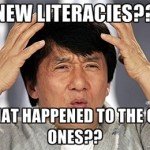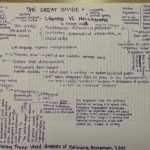
Eli Coyle: Brandt’s The Rise of Writing (Intro & Chapter 1)
Intro & Chapter 1 of The Rise of Writing: Redefining Mass Literacy by Deborah Brandt
The introduction of Deborah Brandt’s The Rise of Writing brings up the idea that digital technologies and digital literacies are responsible for a rise in daily mass writing. Accompanying this is the emergence of the so called knowledge or information economies that aren’t based in “manufacturing things so much as services–knowledge, ideas, data, information, news” (3). One claim Brandt brings up is, “For perhaps the first time in the history of mass literacy, writing seems to be eclipsing reading as the literate experience of consequence” (3). Brandt then wonders about the implications of a mass shift from a reader based perspective into a writing based economy. While the historical value of writing has lied in the reading of it, authorship then takes on a different prestige as society starts to develop a more formative role in its written literacies. One distinction Brandt brings up in her sponsors of literacies is the idea that reading is more often associated with, “leisure, pleasure, worship, intimacy, and social approval and writing more readily with work, adult business, trouble, embarrassment, subterfuge, and trauma” (6). She also notes the role of the workplace in catalyzing changes in written literacies. Writing for Brandt, implies a much more controlled and regulated act than that of its counterpart reading and that is reflected in the role of writing in the workplace:
It became connected not to citizenship but to work, vocation, avocation, and practical living. Writing belonged to the transactional sphere, the employment and production sphere, where high-vaulted values of personal autonomy, critical expression, or civic activism rarely found traction and where, in fact, unauthorized writing could well lead to recrimination, if not incrimination. Rather than being protected in the Bill of Rights, the people’s writing came to be regulated by contract, labor law, and copyright, as writing skills were rented out as part of production and profit making. (2)
This is a rather curious observation that Brandt has brought up and it is ever more apparent that with the development of the internet, literacy has started to shift more into a written based economy. Especially with the development of social networks, email, and text messaging, written literacies are being utilized much more often than they ever were previously .
However, despite the spillover of written literacies into the practical and leisurable realms of society, writing still operates and functions under a economic productivity brought about by government and business. Brandt talks about the roles of ghostwriting and copywriting through which successful people and higher realms of power subordinate their written literacies onto those that labor and author the written work. This practice brings up the idea of authorship and who truly owns the writing that is being produced and circulated. Brandt says, “Indeed, the idea that a text belongs to the person who writes it is not the only concept of authorship that can be found in current US copyright law. When it comes to writing undertaken within the scope of employment–in other words, the writing done by most people in society–copyright turns inside out under a provision called “Work Made for Hire,” the law is careful to sever writers from ownership claims over the texts that they write at work” (20). With this in mind, authorship takes on a more convoluted and conflicting stance giving ownership of literacy to the company or business.
The role of ghost-media-social networking is a similar issues that raises questions of authorship, intent, and accreditation and leads one to question the true author of the work. We see the roles of ghostwriting as well in law and in politics as ghostwriting, “especially highlights power exchanges between writing and social structures, and also illuminates assumptions about underlying reading and writing processes that enable such changes” (31). In a sense, the act of writing in a work or school based environment is a laborious act and those that dictate the content (teacher, lawyer, politician) possess the power over the work.




